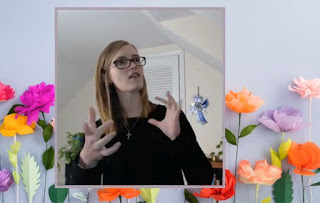by Rev. Leo Yates, Jr.
The invitation was shared.
The prayer service was planned.
Those who joined were Deaf and hard-of-hearing persons and ASL users. They came for an online prayer service. It was an ecumenical virtual gathering in response to the COVID-19 public health concerns. Many state governors encouraged individuals and families to be in prayer due to the devastating impact.
Brenda Kelly-Frey, whose parents are also Deaf, and Rev. Leo Yates, Jr., a deacon in full connection, have been hosting virtual ecumenical prayer gatherings in the Baltimore area. An idea first thought of by Brenda, the prayer service has been drawing Deaf and hard-of-hearing individuals and ASL users from among the various United Methodist jurisdictions. "We're sharing encouragement and hope," says Leo.
Brenda, a member of the Catholic Church, asked Leo, "Why don't we have a
prayer vigil? Can you set it up?" Both were excited to host the prayer
service and felt that a need existed for a place where Deaf and
hard-of-hearing peoples would be able to join and participate in a
period of no in-person gatherings. Shortly thereafter the first
invitation was posted on Facebook.
The signing prayer service provides an online community forum for those who seek to gather as a Deaf community. This provides a place which enables them to share and to request prayers for themselves, their loved ones, and for their communities.
Prayers were lifted up specifically for employment, medical, families, schools and colleges, leadership, mental health, churches, essential workers, and other prayer needs. In addition, participants assisted with signing Scripture verses.
Visual presentation is an important part of a Deaf service, which includes Yates' mini altar. He described that the cross had bandages to remember to pray for those who are suffering, a prescription bottle to remember to pray for those who are ill, and a packet of tissues to pray for those who are suffering or struggling right now. Along with the cross were a candle of hope, representing the light of Christ during dark times, and a Bible representing that God is still with us.
Other Deaf communities are also hosting prayer services, such as the Deaf Ministry at Lovers Lane UMC in Dallas, TX, which is led by Rev. Dr. Thomas Hudspeth. It too has people joining from all over the country. Rev. Tom's congregation also hosts weekly worship services.
Other Deaf congregations, such as Christ Church of the Deaf in Baltimore and Magothy Deaf Church in Pasadena, MD, also host weekly online worship and study opportunities.
Along with these Deaf congregations, several Deaf ministries (hearing
churches with interpreting ministry) are making their worship service
accessible for their Deaf, hard-of-hearing, late-deafened, and Deafblind
members. Sign language interpreter Rosalind McKelvey makes the
services at Grace UMC in Philadelphia, Pennsylvania accessible via Facebook Live
where Deaf and hard-of-hearing members log in to watch both the
interpreter and the worship service.
Churches have been using YouTube and similar services to record worship for some time. Recent improvements have made captioning much more feasible. Improved voice-to-text technology reduces the amount of editing required, and editing is much faster and accurate than before. Rev. Rebecca Holland of the Susquehanna Conference has been using this feature regularly after tutoring from one of the Deaf and Hard-of-hearing Committee's consultants.
Also, sign language interpreters are incorporated into addresses and sermons by several bishops, such as Bishop LaTrelle Easterling of the Baltimore-Washington Conference, Bishop Peggy Johnson of the Pen-Del and Eastern PA Conferences, and Bishop Ken Carter of the Florida Conference. These help model accessibility and inclusion for the wider church.
Because ASL is a visual language, in-person gatherings are ideal, and historically a cultural norm for persons who are a part of the Deaf community. However, virtual gatherings are similar to the video calls Deaf and hard-of-hearing persons often do with one another on their video phones--it's just now that they are on a larger scale. Virtual gatherings are helping ALL of us to keep connected.
Similar to the Deaf online services, the United Methodist Association of Ministers with Disabilities (AMD) also hosts bi-weekly check-in calls via Zoom. This group includes ministers with disabilities (not necessarily clergy) and advocates. If you minister with a disability, and need community, contact Rev. Hank Jenkins (hank.jenkins@gmail.com) to join.
For information about including everyone in your meetings, read our recent blog post. For more information on how to make your online services accessible, contact the committee by e-mail at umdeaf@gmail.com or Rev. Yates at RevYates@eumclaurel.org or click here to learn more. To explore other accessible virtual services, visit the United Methodist Deaf and Hard-of-hearing Committee's Ministry Directory.









No comments:
Post a Comment